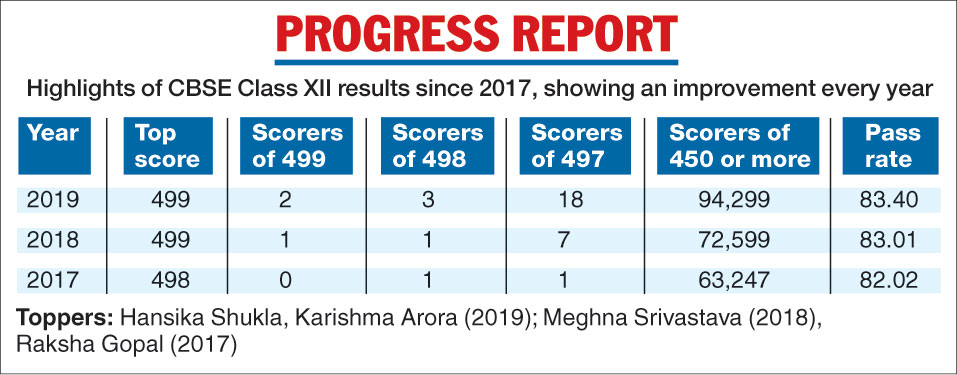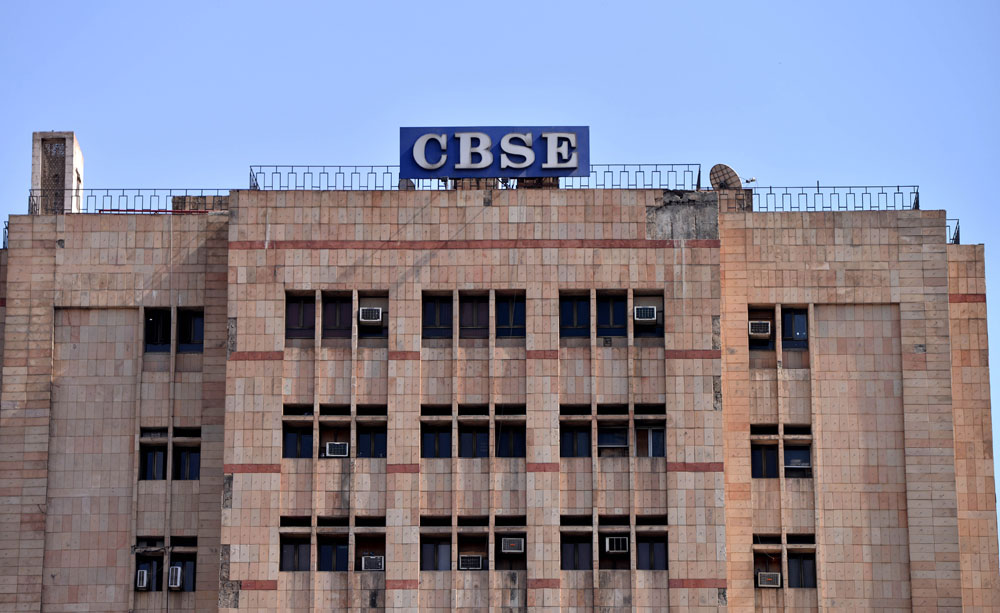Two students from the humanities stream have topped the CBSE Class XII board exams, whose results were announced on Thursday.
This year’s results have broken records in high scoring but also raised questions about the system of assessment.
Apart from being declared in a record 28 days since the exams ended, the results showed that 94,299 students had scored over 90 per cent against a figure of 72,599 last year. (See chart)

Hansika Shukla from DPS Meerut Road, Ghaziabad, and Karishma Arora from the S.D. Public School, Muzaffarnagar, Uttar Pradesh, topped with 499 each. Last year, only one student had scored 499.
Three students have obtained 498, and each of them was from the humanities stream too. Of the 18 who have scored 497, only 6 are from the science stream. Last year, just one student had scored 498 and 7 had secured 497.
The sharp rise in the number of students scoring over 90 per cent means the admission cut-offs set by the reputable colleges in Delhi and elsewhere would be higher than last year’s.
Poonam Batra, a professor at the Central Institute of Education under Delhi University, said such high scores owed to the objective-type questions the CBSE has been favouring and, paradoxically, reflected poor learning.
“Obtaining high marks has become a pattern in the CBSE exams ever since they started the practice of using multi-choice and short-answer-type questions. Students are not being trained to develop a coherent argument on a subject they are studying. Instead, they are being prepared for an evaluation pattern that expects them to answer in short, sometimes even disconnected, sentences and in the language of the textbook,” she said.
“High marks may even be reflective of poor understanding. High marks indicate that the students have learnt how to crack the code of the examination, not necessarily that they have grasped concepts. For example, in literature, they need to develop deep understanding of poetry or novels or drama, including metaphoric meanings. But such layered understanding is discouraged by the existing evaluation system.”
She added: “The model answers available on the CBSE website clearly indicate that the students are discouraged from developing critical thinking, conceptual understanding and the application of knowledge. The evaluation pattern rarely prompts the students to go beyond rudimentary understanding, which is closer to memorisation than conceptualisation.”
Jyoti Bose, principal of Springdale School, Dhaula Kuan, said the CBSE students’ scores were rising every year but it did not necessarily mean their learning was improving.
“A score of 80 per cent now is equivalent to a score of 50 per cent from earlier decades. The students are scoring 100 out of 100 even in social science subjects,” Bose said.
This, she said, was possible because the exam questions were “value-free”, requiring the examinees only to furnish facts, although “social science as a discipline is not value-free”.
The two students who have scored aggregates of 499 in five subjects would have scored 100 out of 100 in four subjects each. If a student is awarded full marks in a subject, it implausibly implies that their answers could not be improved upon, Bose said.
Delhi University professor Anita Rampal said: “Inflated marks help school boards show ‘good results’ and pass percentages in their bid to compete with other boards. It also absolves them of the responsibility of ensuring environments for good and meaningful learning, because everyone is ‘happy’ with ‘good’ marks (rather than being) concerned about depth of understanding.”
CBSE secretary Anurag Tripathi defended the evaluation system.
“Scoring 100 out of 100 is very much possible when the syllabus is fixed. We have a marking system: if the student’s answer is in accordance with the marking pattern, full marks can be awarded,” Tripathi said.
A recent report on possible exam reforms by a committee headed by M.M. Salunke, set up by the University Grants Commission, said that most Indian universities tested only their students’ memory, that is, they encouraged rote learning. The questions did not demand analytical skills on the students’ parts.
So, the students obtained their degrees and diplomas without acquiring the desired level of knowledge.
The teaching style in the universities too is attuned to enabling the students to score high marks in their annual or semester exams, the committee found. It suggested the introduction of international methods of evaluation and more practical and project-based learning.
The CBSE had issued a circular earlier this year asking its affiliated schools to encourage “experiential”, or more hands-on, learning. But academics say the present evaluation system is not ideal for testing the students’ experiential learning.
Usha Ram, a former school principal, said the high marks were also a result of the examinees putting in a lot of effort.
She added that this year’s questions were more straightforward compared with earlier years’.
Altogether 12.05 lakh students from 12,441 schools took the exam. The Thiruvananthapuram region witnessed the highest pass percentage of 98.2 per cent. The overall pass percentage for girls was 88.7 and that for boys, 79.4 per cent.
The central-government-run Kendriya Vidyalya Sangathan schools recorded the highest success rate of 98.54 per cent, followed by the Navodaya Vidyalaya Sangthan (96.62). The overall pass rate for the private, independent schools was 82.59 per cent, the lowest.











